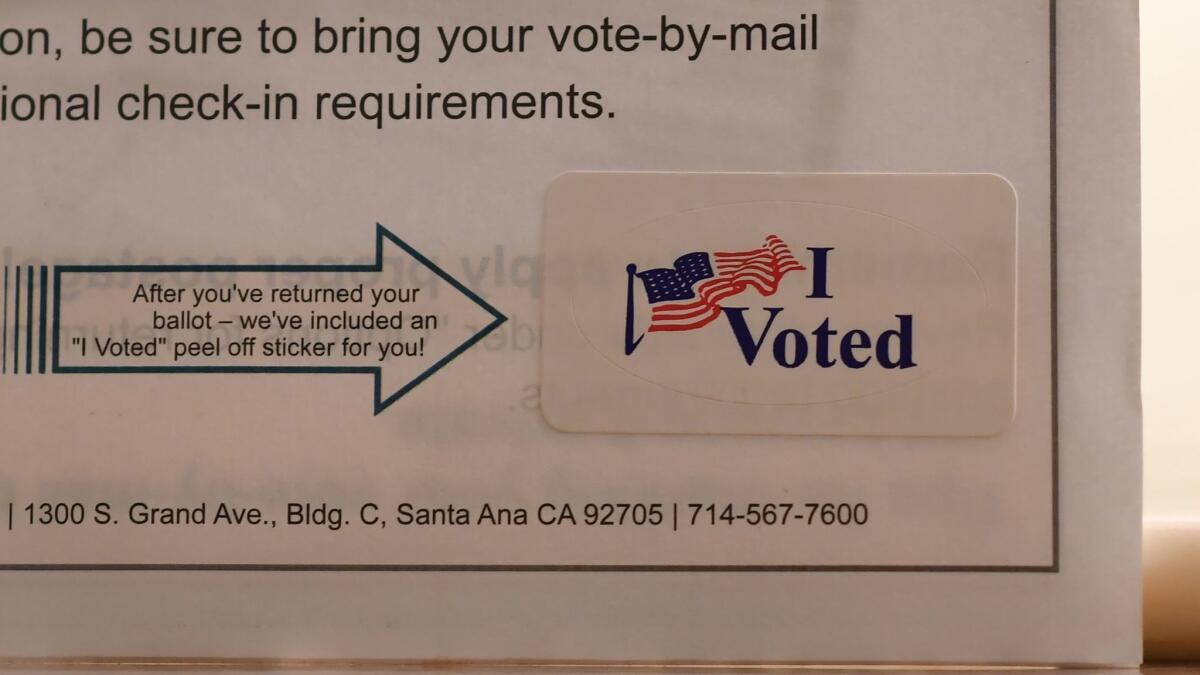Capitol Journal: The good, the bad and the egg-laying hens: Here’s how you should vote on the ballot propositions

- Share via
Reporting from Sacramento — California voters have the U.S. president trumped. They can change the state Constitution on their own. The president has no power to amend the U.S. Constitution.
That’s elementary bonehead civics. But President Trump seemed to be ignorant of his limits when he fantasized the other day about issuing an executive order to abolish so-called birthright citizenship. That would be unconstitutional.
Californians, however, have the power to amend the state Constitution by voting on ballot propositions. Two proposed constitutional amendments are among the 11 ballot props on Tuesday’s state ballot.
Both should be rejected.
Proposition 5 would amend property tax laws to greatly benefit homeowners who are at least 55, severely disabled or disaster victims. They could sell their homes and carry their Proposition 13 tax break with them to another house anywhere in the state, even if it was more expensive. And they could do that repeatedly — an invitation to gross misuse.
Currently the tax break “portability” only works if the new house isn’t more expensive than the old one. It is allowed just once. And generally it must be in the same county, although 10 — including Los Angeles — accept property tax base transfers from other counties.
This eventually would cost local governments and schools $2 billion annually in lost property taxes. The real estate industry’s proposal is a bad buy.
Proposition 6 would repeal the year-old increase in fuel taxes and vehicle fees. They raise $5 billion annually to repair roads and bridges. There’s also money for transit and bicycle lanes that help keep vehicles off roadways.
Highway repairs must be paid for by highway users. It has always been that way. Repealing the gas tax increase would mean a lot fewer repairs and many more crumbling roads. It’s a cruddy bargain.
There are also nine proposed statutes on the ballot. Here’s my take:
Proposition 1 would authorize selling $4 billion in bonds to make a small dent in the unaffordable housing problem. Of that, $3 billion would finance new or rehabilitated apartments for low-income people, help with down payments and provide money for farm worker housing.
There’d be $1 billion for veterans’ home loans.
It’s a good use of bond financing.
Proposition 2 would help finance 20,000 new housing units for homeless people who are mentally ill. It would be paid for by $2 billion in bond borrowing backed by the so-called millionaire’s tax that is used for mental health treatment.
Seems sensible.
Proposition 3 would authorize the largest water bond in state history, $8.9 billion. It’s a classic pay-to-play measure: The initiative sponsor shops his proposal to interest groups, and those who buy in by helping to finance the campaign share in the benefits. That’s one problem.
A bigger one is that significant bond proceeds would pay for repairs to Central Valley water facilities. Historically, the water users — in this case mostly farmers — have paid for these facilities, not the entire state. And the state doesn’t even own one badly damaged irrigation canal targeted for a $750-million repair. The federal government does.
This proposal would set a bad precedent.
Proposition 4 would authorize $1.5 billion in bonds for construction, renovation and equipping children’s hospitals.
Who can resist this?
Proposition 7 would allow the Legislature to ask Congress and the president to shift California to year-round daylight saving time. To think that a Republican Congress and Trump would accede to California’s wishes on this is to hallucinate.
Anyway, it would mean kids walking to school in the dark in winter. In late December, the sun wouldn’t rise in L.A. until almost 8 a.m.
The Legislature has better things to do than mess with this.
Proposition 8 would limit the revenue of kidney dialysis clinics. Union sponsors contend it would encourage clinics to spend more on patient care. But clinic opponents say it’s the opposite: The measure would force them to reduce care or even shut down. They’re spending a record $110 million-plus to defeat the initiative.
This is the real play: The Service Employees International Union-United Healthcare Workers has been having trouble organizing at two major dialysis chains. So this is union bullying: “Deal with us or we’ll make you pay.”
Voters shouldn’t be settling a labor dispute — nor limiting the revenue of a private enterprise.
Proposition 10 would permit cities and counties to greatly expand rent control — not just in apartments but, for the first time, single-family housing. Sponsors say controlling rent would help keep low-income tenants from becoming homeless. Opponents counter that controls could drive up rents by reducing the rental supply.
Here’s another case where government shouldn’t be controlling prices charged by private enterprise.
Proposition 11 would require private ambulance crews to be on call during meal breaks.
Duh. Ask for a doggie bag.
Proposition 12 would require farmers to provide better living conditions for egg-laying hens, veal calves and breeding pigs.
By 2022, hens would be entitled to cage-free housing, calves would be guaranteed 43 square feet of floor space and pigs would get 24 square feet. Egg farmers are crying fowl. But some animal rights groups claim the measure doesn’t offer enough comfort for hens, calves and pigs.
Sure, OK. But too bad we don’t show as much compassion for our human homeless.
One good thing: In California, we can enact or reject many laws simply by casting a ballot — something no one can do with federal laws, not even a president.
Coverage of California politics »
Follow @LATimesSkelton on Twitter
More to Read
Get the L.A. Times Politics newsletter
Deeply reported insights into legislation, politics and policy from Sacramento, Washington and beyond. In your inbox three times per week.
You may occasionally receive promotional content from the Los Angeles Times.











